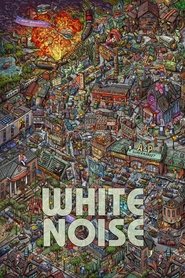Fredrick Jameson would have a lot of fun dissecting how this adaptation displays our belief in the malleability of artistic forms can be observed in postmodernity (etc.), but I didn't have quite as much fun watching this. For the same reasons that David Foster Wallace's Infinite Jest is essentially unadaptable — its shape, timbre and attachment to a particular cultural moment — White Noise (2022) is, at best, a waste of Greta Gerwig. Many of the key elements of DeDillo's superb novel simply cannot be translated to the screen, the least of which is the novel's decision to downplay the traditional primacy of plot, something this film version feels obliged to put back in: explicitly through its labelled sections, but also implicitly as well through the introduction of cinematic drama.
Perhaps a straight-to-Netflix film simply can't avoid putting narrative oomph back in, and nor can it contain other neo-Brechtian devices such as child characters spewing pseudo-academic philosophy at 800 words a minute: it's just too close to all of the naff $5m potboiler films put out by the streaming networks. But even taken on its own terms, though, the dialogue of White Noise often rushes over itself, which has the effect of obscuring many of the screenplay's many excellent observations about postmodern existence. A few of my favourite ideas from the book were skated over in this way: the Baudrillardian signified—signifier reference (about the real disaster will help improve future modelling for their simulation) as well as the jokes ("You thought Hitler would protect you!"), etc. But some were also missed out entirely; I'm thinking in particular of the back-and-forth concerning the 'most photographed barn in America', perhaps the philosophical backbone of the book.
Unmoored from the decade and the episteme of the origin book, White Noise uses that aggressively 'authentic' set decoration to invoke our (very contemporary) idea of the 1980s as well. It was unclear what this conspicuous use of 'correct' props was trying to do, beyond looking like a pastiche of a Spielberg movie from the era. At best, it was reflecting our contemporary tendency to flatten history into a suite of aesthetics, but what it really seems to be suggesting that the dysfunction displayed by the film's characters is a direct result of our material and consumption-oriented environment. Still, I find it difficult to think that is anything other than a highly superficial reading of the book's obsession with the supermarket and brands. DeLillo's White Noise was doing something else, something much deeper and harder to grasp, hence why he put it in novel form. So this Wes Anderson 'perfect supermarket' just seemed to land a little short to me, as did the actually seeing all of that Hitler stuff in the flesh.
An underlying problem seems to be that the characters in the book were actually literary avatars and not characters in the way they are commonly understand. Their purpose is to communicate ideas to the reader in a way that cannot be captured in prose form, rather than be 'realistic', incorporating how they compartmentalise reality through various external filters. It is possible to use avatars in the cinematic form: see anything by David Cronenberg, for example. But Baumbach either didn't grasp this, or he didn't understand how to transpose them to the screen, and you are ultimately left with something of a mess. The one avatar that did work was Don Cheadle's character. It would perhaps have been better if the whole film was a little more farcical in tone. That way, we wouldn't try and connect with these characters on any kind of emotional level.
Clearly, Baumbach is a huge fan of the book, but it would be a more effective advertisement if they simply put this film's $100m budget towards giving the novel away for free.
While Baumbach is a smart enough reader to understand White Noise, he’s not a fluid enough filmmaker to capture its epic, immersive surreality, or to manage its wildly digressive yet ultimately thin plot. […] On some level, the effort to wrestle White Noise into a functional cinematic shape is heroic [b]ut it’s also thankless, a 136-minute struggle session without any catharsis at the other end. […] DeLillo is so judicious about what he does and doesn’t show in the book that the movie’s most spectacular images […] come off as missteps that are antithetical to the text’s rigorous ambiguity. Meanwhile, the things that Baumbach deliberately chooses to omit, like the “Most Photographed Barn in America”—a dissertation-ready symbol of an image-saturated culture that’s widely considered one of DeLillo’s greatest hits—will be missed by diehards, even if that’s beside the point when it comes to the film’s more overarching failures. Put simply, it’s hard to be glossy and arch at the same time.
— Adam Nayman (The Ringer)

